FILM
A Path Appears, from the creative team that brought you the groundbreaking series Half the Sky: Turning Oppression into Opportunity for Women Worldwide, follows intrepid reporters Nicholas Kristof and Sheryl WuDunn and actor/advocates Malin Akerman, Mia Farrow, Ronan Farrow, Jennifer Garner, Regina Hall, Ashley Judd, Blake Lively, Eva Longoria, and Alfre Woodard to Colombia, Haiti, Kenya, and throughout the United States as they uncover the harshest forms of gender-based oppression and human rights violations, as well as the effective solutions being implemented to combat them.
The three-part series aired on PBS as a special presentation of Independent Lens in early 2015 as part of the highly regarded Women and Girls Lead initiative. Through heartrending, inspiring storytelling, A Path Appears takes viewers on a journey across the country, and across the globe, to drive home the universality of gender inequality and the roots of vulnerability. The series leads viewers to a deeper understanding of these critical issues and the proven methods of bringing about change.
Watch the film
Order the DVD
Streaming
The Episodes
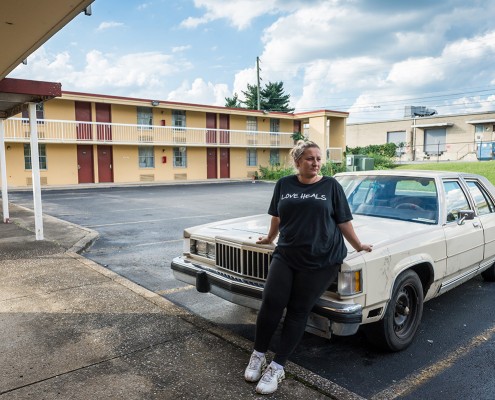
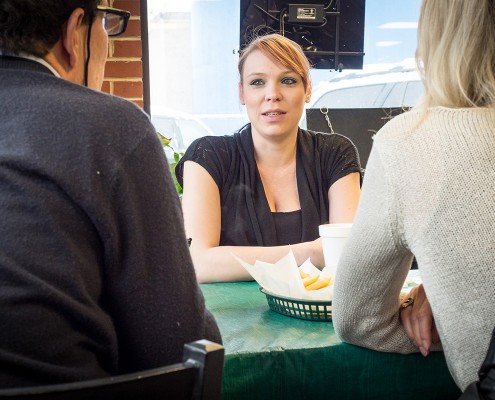
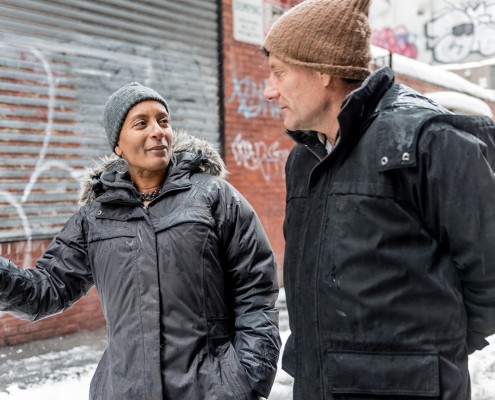
Episode One: Sex Trafficking in the USA
Premiered January 26, 2015 on PBS
The Department of Justice estimates that there are 300,000 children at risk of being trafficked into sexual slavery in the U.S. In the first episode of A Path Appears, we meet the survivors behind these shocking numbers, and illuminate the widespread existence of this violent crime taking place across America.
Ashley Judd and Nicholas Kristof travel to Nashville’s where they visit the Magdalene House and meet Shana Goodwin, whose earliest memories are of being sexually abused by her grandfather. Shana guides them through the streets where her mother first sold her to a pimp at the age of 12. Shana, and the other survivors of sex trafficking and prostitution, paint a complex picture of the problems that exist and the solutions we need to see.
In Boston, Blake Lively joins Kristof as they visit the nationally recognized anti-trafficking organization My Life My Choice. We witness the devastating moment when Maria discovers her missing 15-year-old daughter, who she feared had fallen prey to a trafficker, being sold through backpage.com. Followed by relief from her daughter’s successful return and recovery. Then we meet Savannah, another young trafficking survivor who was stalked by an older man on a “sugar-daddy” website and then sold only to be held in sexual bondage. Months into her recovery, she is rebuilding her relationship with her mother, whose own history sheds light on the generational nature of trauma and exploitation.
Approximately 15 percent of American men regularly purchase sex, but few are ever penalized. Kristof and Malin Akerman address this statistic in Chicago when they visit Cook County Sheriff Tom Dart and his team who are leading the country in reshaping law enforcement’s response to prostitution and trafficking. We go behind the scenes on a sting operation to crack down on the buyers of sex on the annual, nationwide Day of Johns Arrest.
The episode concludes with a return to Nashville to revisit Magdalene’s social enterprise, Thistle Farms, which provides survivors with the full range of services necessary to their healing as well as essential job skills. Led by Reverend Becca Stevens, the program proves that while the reality is horrifying and the long-term impact on survivors is devastating, there are solutions.
Support an organization featured in Sex Trafficking in the USA
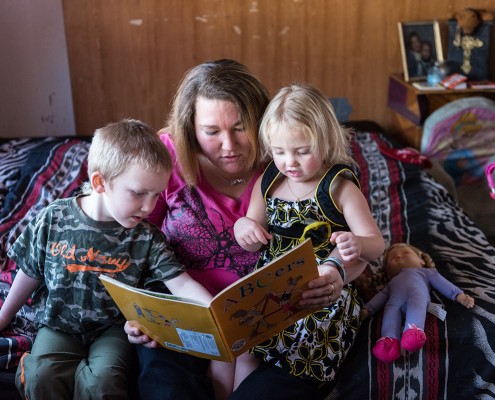
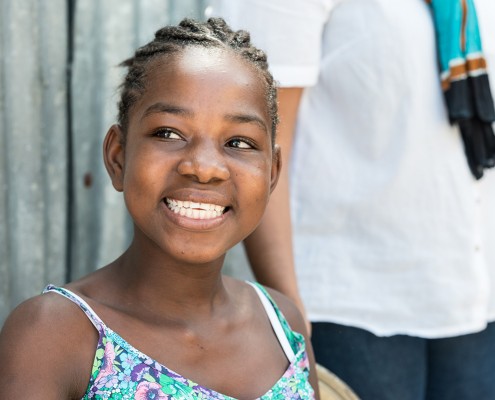
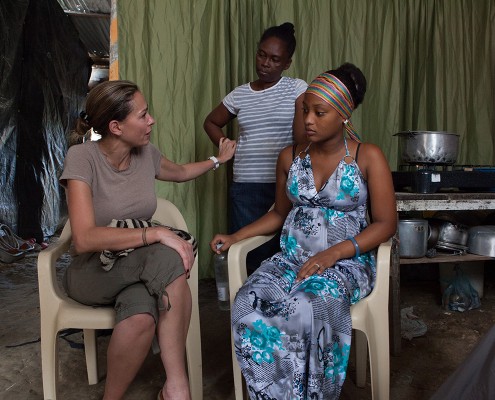
Episode Two: Breaking the Cycle of Poverty
Premiered February 2, 2015 on PBS
With Nicholas Kristof, Jennifer Garner returns to her native West Virginia to visit families enrolled in Save the Children’s Early Steps program, which introduces books and early learning to children living in poverty, and provides social and emotional support for the mothers. One child benefiting from the program is Johnny Weethee, who was just accepted into pre-K with the help of program coordinator Tonya Bonecutter. We also meet Lyn Sargent, also in Tonya’s care, who lives in a trailer with her husband, two children, and eight others. Having broken the cycle of poverty, sexual and drug abuse, Lyn is now enrolled in school full-time, hoping to provide a better future for her children.
Next we visit Haiti, which, even before the devastating 2010 earthquake, was the poorest country in the Western Hemisphere. Billions of dollars in well-intentioned aid have gone into the country, but demonstrable results have been few and far between. Alfre Woodard joins Kristof and Sheryl WuDunn to meet Rea Dol, founder and leader of SOPUDEP (Society of Providence United for the Economic Development of Pétion-Ville) who is providing education to children from the poorest backgrounds in her community, including restavek children-child laborers at risk of abuse.
We meet one such girl, Marilaine, who desperately wants to leave the home where she is beaten and mistreated. Rea enlists the aid of other local activists and the Haitian police to orchestrate a rescue. But while Marilaine’s escape removes her from immediate danger, her options are limited because her mother has 12 children, no food, no transportation, and there is no school for miles. It is the education that Marilaine receives at the SOPUDEP school that provides the most viable, long-term opportunity for her and her classmates to reach their full potential and begin to rebuild their nation. But there is no easy fix.
In Cartagena, Colombia, Kristof, WuDunn and Eva Longoria meet Catalina Escobar, founder and director of the Juan Felipe Gomez Escobar Foundation (“Juanfe”). Following the tragic death of her young son, Catalina, a successful businesswoman, decided to devote her life to the pregnant teens and young mothers from local slums. Juanfe’s model is a “360 degree intervention” that includes health care, intensive therapy, education, family planning, vocational training, an infant center, and a medical clinic that has served more than 84,000 low-income residents in the community.
The pregnant girls who enroll in Juanfe, some as young as 12, have already dropped out of school and have virtually no other opportunities. Demalis, who at 15 was prostituted and became pregnant, is a new applicant. She has returned to Cartagena and hopes that Juanfe will offer a new chance for herself and her baby.
Support an organization featured in Breaking the Cycle of Poverty
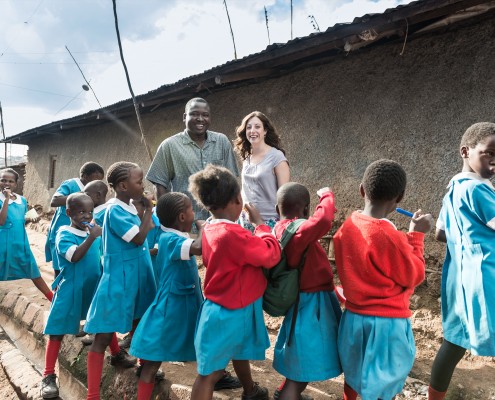
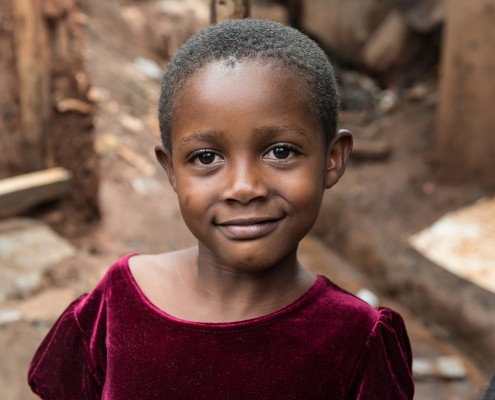
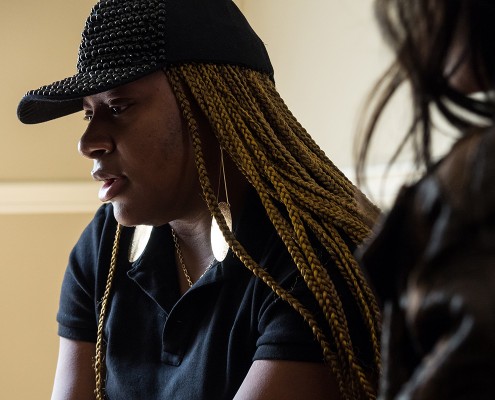
Episode Three: Violence and Solutions
Premiered February 9, 2015 on PBS
In the United States, domestic violence claims more than three lives a day on average; one in every four women will experience it during their lifetime. In this episode, Nicholas Kristof and Regina Hall visit Atlanta to explore the work of two organizations that combat the issue. At the Women’s Resource Center, a shelter, aid, and advocacy organization for battered women, they meet Ayonna Johnson, a legal advocate who gives them a first-hand look at how the legal system often works against abused women. Brave survivors share their experiences about the often-difficult reality of leaving a domestic abuser behind. From the other angle, we meet Men Stopping Violence educator, Sulaiman Nuriddin, who works directly with men who have abused their partners to help them change their behavior. Through these journeys, A Path Appears offers a vital perspective on the work of addressing both the immediate needs of the survivors and the larger mission at hand — creating a cultural shift that will end domestic violence.
In Kenya, Mia Farrow and Ronan Farrow join Kristof as they visit Shining Hope for Communities, an organization working for change in Kibera, one of the worst slums in the country — and the world. Home to hundreds of thousands of people, Kibera has limited power and running water and young girls attending the Kibera School for Girls report being raped or sexually abused before preschool age. At the Kibera School for Girls we meet charismatic activist Kennedy Odede and his wife, Jessica Posner Odede who have created a program that offers a holistic approach to Kibera’s many problems, offering health services, aid with navigating the frustrating legal system, and opening the Kibera School for Girls, which aims to provide the area’s most at-risk young girls with a path out of poverty and abuse.
We meet a young girl named Flavian who is unable to walk and who has been raped repeatedly over many years by her grandfather, and join the Shining Hope team as they try to get her both medical attention and justice in the courts. While the problems that plague Kibera may seem insurmountable, Shining Hope is making a difference. With Kennedy’s infectious optimism and strong leadership and Jessica’s organizational skills, they are reaching more and more of Kibera’s residents and chipping away at the hopelessness that has for so long afflicted the region.



